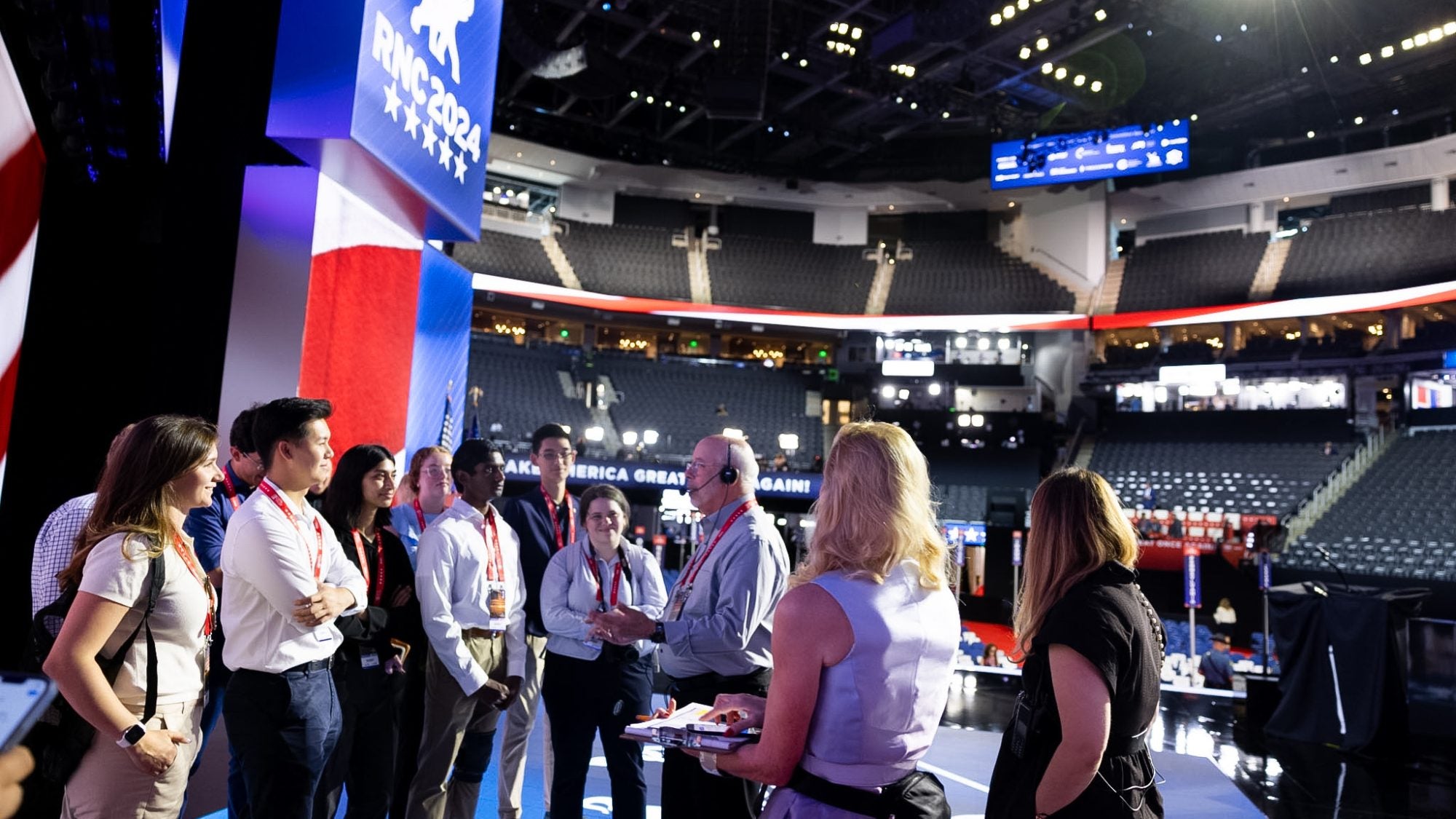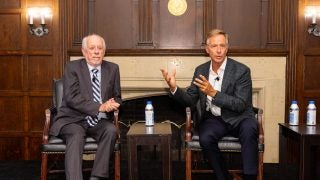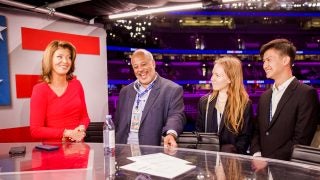Over her first three years at Georgetown, Alisha Singh (C’25) has learned the ropes of Capitol Hill. She interned for U.S. Rep. Barry Moore (R-Alabama) one semester and U.S. Sen. Katie Britt (R-Alabama) this past summer.
But the government major has also received immersive training right on campus in Washington, D.C.
As part of the Georgetown Institute of Politics and Public Service (GU Politics), an organization that prepares students for public service and creates space for political discourse, Singh has worked closely with visiting political experts from both sides of the aisle. Every semester, a cohort of GU Politics Fellows, which represents political leaders, journalists and public servants from across the political spectrum, share their experiences off-the-record with students in discussion groups.
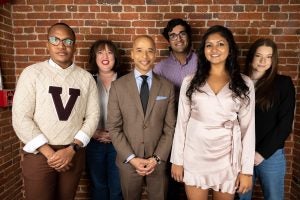
During the round-table discussions, Singh learned from fellows like Elliot Williams, a CNN legal analyst and former deputy assistant attorney general, and Chris Stirewalt, an anchor at News Nation and former political editor at Fox News. She listened to differing approaches to issues and policies from fellows and fellow students. And along the way, Singh found that the discussion groups not only deepened her understanding of the political arena but also made her think more deeply about her own beliefs — and see a place for herself in politics.
“I think it’s really important that there’s that space for students to talk and understand where other people are coming from,” said Singh, who’s the undergraduate co-chair of GU Politics Student Advisory Board. “It’s not about trying to change what one person thinks but trying to understand why they got there, what in their life has shaped their policy preferences, their political points of view, and informed how they think about things.”
The discussion groups are just one way GU Politics encourages political engagement and civil discourse at Georgetown, fostering opportunities to pop ideological bubbles and connect people of all backgrounds and political views to improve politics.
“Our students come from all of Georgetown’s undergraduate and graduate schools, from diverse backgrounds, from communities all over the world, and from all points on the partisan and ideological spectrum – but they’re united in a desire to get involved in the process and make it better,” said Mo Elleithee (SFS’94), executive director of GU Politics. “We create opportunities for them to interact with world leaders and one another to foster dialogue and partnership across the aisle.”
Civil Dialogue on the National Stage
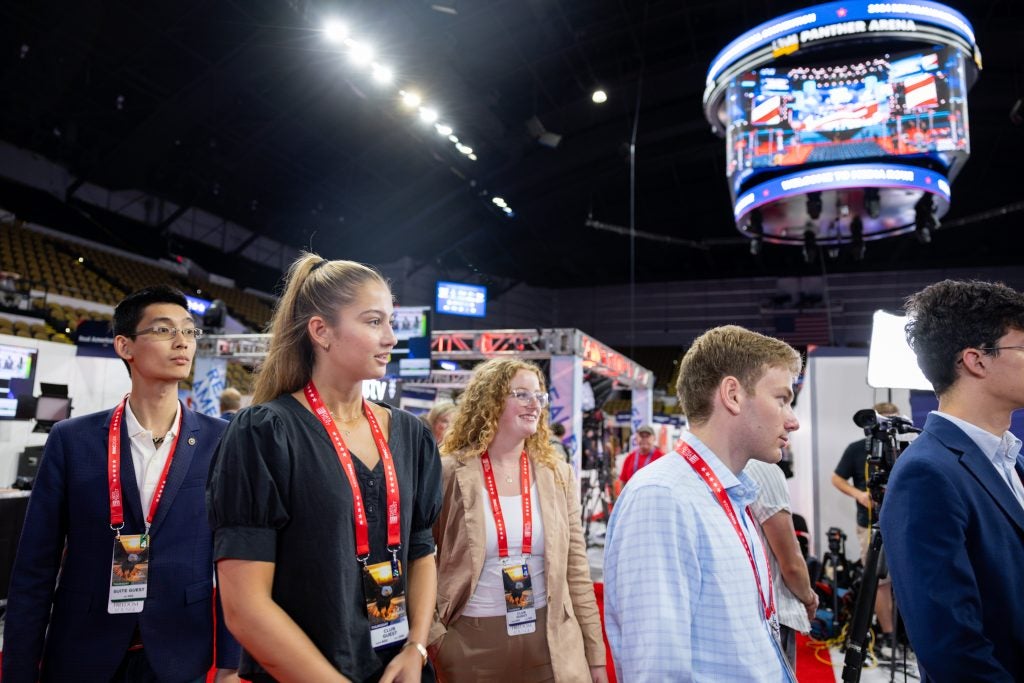
This summer, GU Politics brought students from both sides of the aisle to the Republican and Democratic National Conventions. Students learned not only what goes into planning a convention, but they also met with political leaders and learned more about their backgrounds.
Maddie Davis (G’25), a graduate student in the McCourt School of Public Policy, attended the RNC in Milwaukee in July. She spent the summer interning for a Democratic representative and wanted to gain a deeper understanding of the Republican Party and its perspectives.
Throughout the week, Davis met with political players like Reince Priebus, a former Republican National Committee chairman and White House chief of staff, and Chris LaCivita, Donald Trump’s 2024 campaign senior advisor. She learned the behind-the-scenes logistics that go into producing the event, and she learned more about her own political passions.
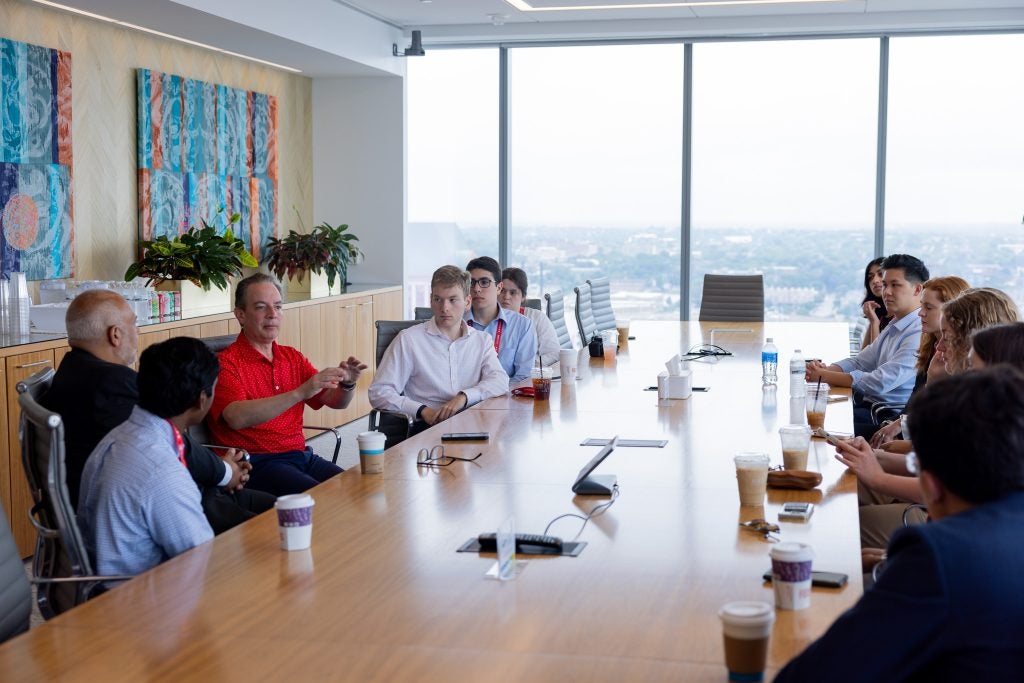
“Conversing with party officials, politicians, journalists and delegates deepened my understanding of politics but, more importantly, renewed my commitment to public service and political engagement,” she wrote in a blog for Georgetown.
Civil Dialogue on Campus
GU Politics offers events, programs and spaces for students to dialogue on campus, like its Living Room, an open space in the office for students to connect. The organization also hosts leaders like Secretary of Transportation Pete Buttigieg and former Vice President Mike Pence to offer opportunities for students to engage directly with public officials and ask them questions.
“So much of what we do is show that you can have civic dialogue,” said Julia Newton, managing director of GU Politics. “We’re very intentional about bringing in speakers and fellows with a variety of backgrounds and different points of view. We’re showing that you can have this back and forth, you can have this dialogue with one another.”
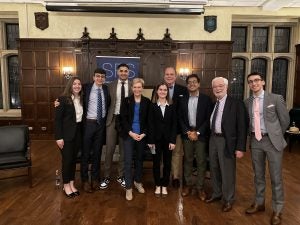
While an undergraduate at Georgetown, Aryaman Sharma (SFS’24, L’27) wanted to create more opportunities for students to feel comfortable voicing their views. Sharma grew up in Fargo, North Dakota, where he learned to dialogue with friends and community members who held different political views. He was motivated to foster a similar environment on the Hilltop.
As a leader on GU Politics’ Student Advisory Board, Sharma worked closely with the School of Foreign Service and BridgeUSA, a bipartisan youth organization, to organize an event called Addressing the Elephant in the Room: A Conversation on Implicit Bias, which addressed bias and how to move forward from it.
“We ran it like a GU Politics discussion group where you have very smart, experienced people in the room, but then you also empower the students themselves to speak up and share their thoughts,” he said. “And hopefully through that we can realize our backgrounds and upbringings help shape who we are. That does not necessarily mean we are bad people.”
Sharma also organized football watch parties in the Living Room of GU Politics to connect students who have shared interests in sports. Now in his first year at Georgetown Law, Sharma said the experiences in civil discourse helped reinforce the importance of understanding differing perspectives to achieve a common goal as well as of cura personalis, or care for the whole person, to get to know others’ backgrounds and beliefs.
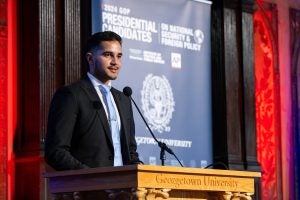
“I think the idea of cura personalis has truly always resonated with me in that I’m not just a test score. I’m not just an activist. I’m not just someone who does well on exams. I am a full person,” he said. “At Georgetown, I truly felt like they wanted me to be my best whole person.”
In the lead-up to the 2024 presidential election, GU Politics is also working to ensure students have the information they need to be educated voters — especially first-time voters.
On Sept. 17, GU Votes, a student-led initiative that works to simplify the voting process for students, promoted voter registration in first-year dorms and other public spaces on campus as part of their annual Storm the Dorms program. In addition to voter education, they plan to foster opportunities for dialogue among students in the run-up to the election, said Sam Lovell (C’25), a co-president of GU Votes.
“With how quick moving this election is, it is such a historic period that helping students facilitate their voice is really important,” he said. “I think Georgetown’s a great place of many ideas and people that are willing to speak about those ideas candidly. So I’m excited for what the upcoming months hold, and I trust that the Georgetown community also values those same principles of civic dialogue and peaceful dialogue.”
